中考英语全国通用版二轮专项复习介词(共39张PPT)
文档属性
| 名称 | 中考英语全国通用版二轮专项复习介词(共39张PPT) | 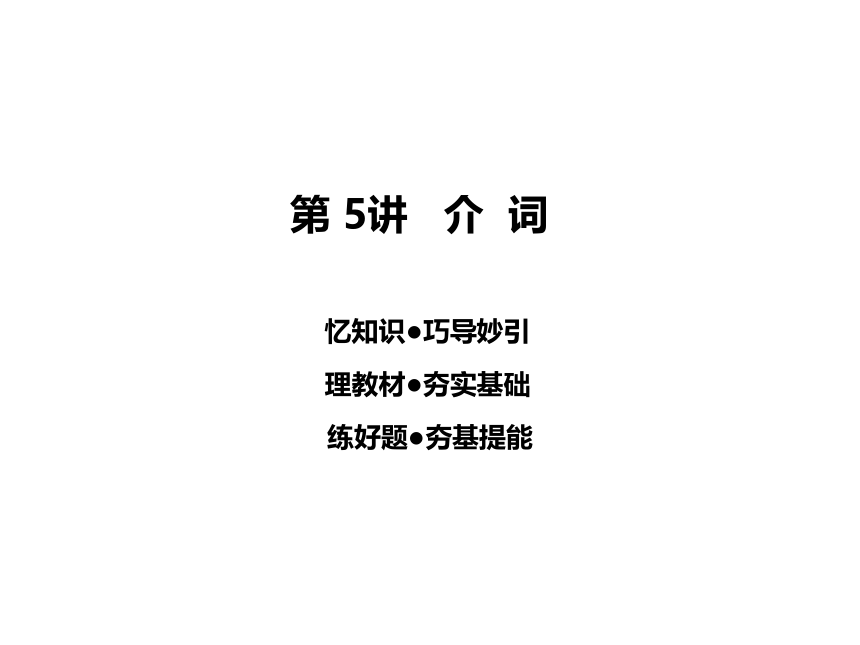 | |
| 格式 | pptx | ||
| 文件大小 | 685.2KB | ||
| 资源类型 | 教案 | ||
| 版本资源 | 通用版 | ||
| 科目 | 英语 | ||
| 更新时间 | 2023-06-22 21:36:03 | ||
图片预览

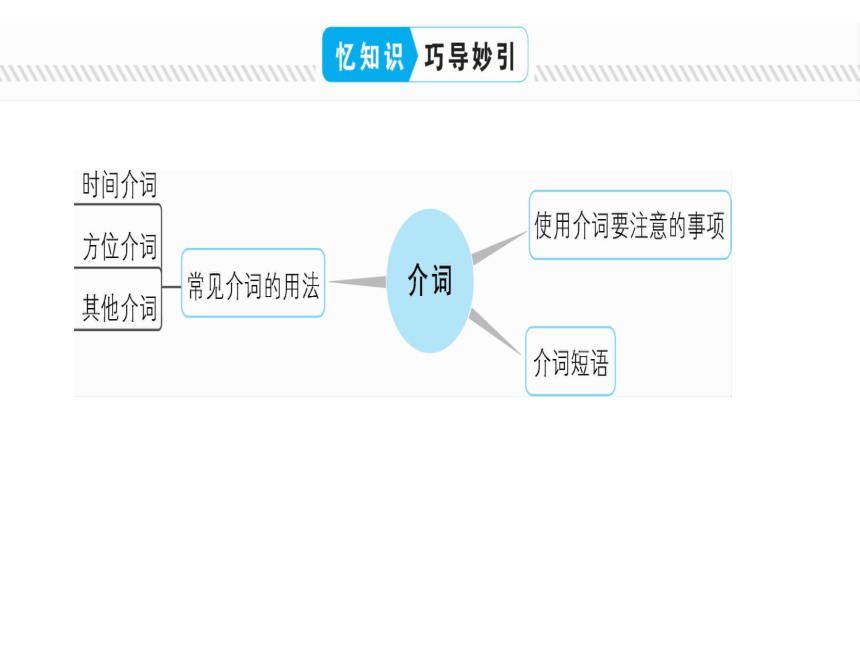
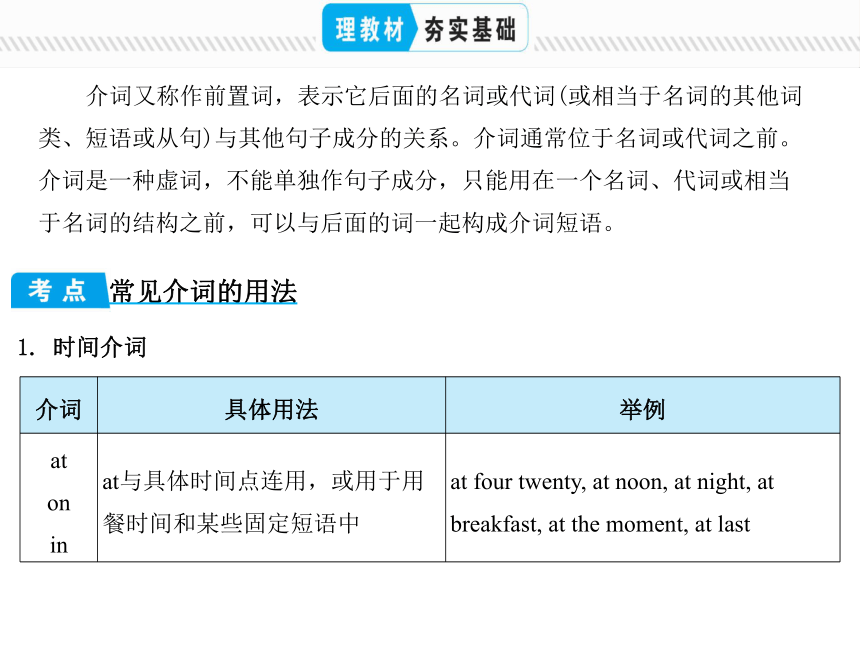
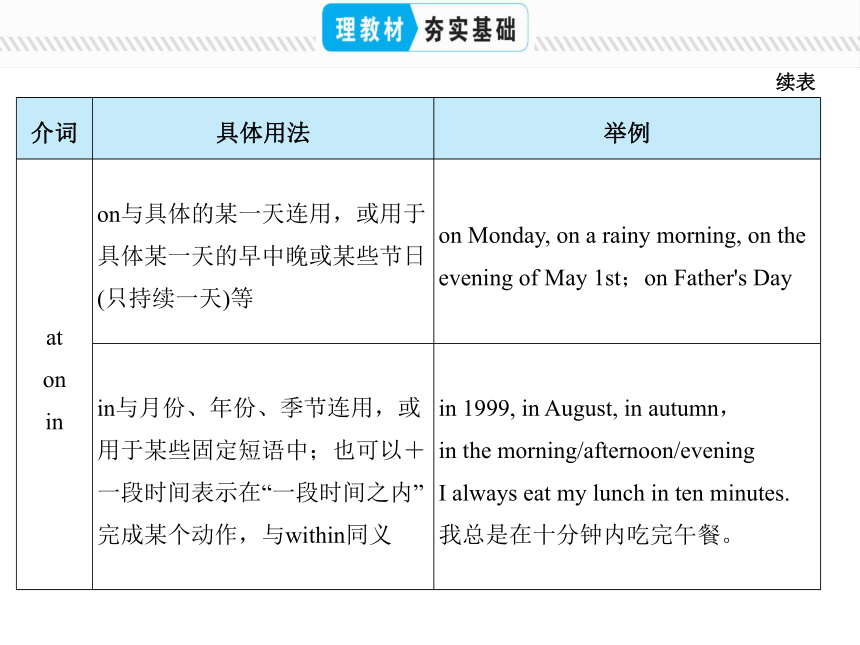
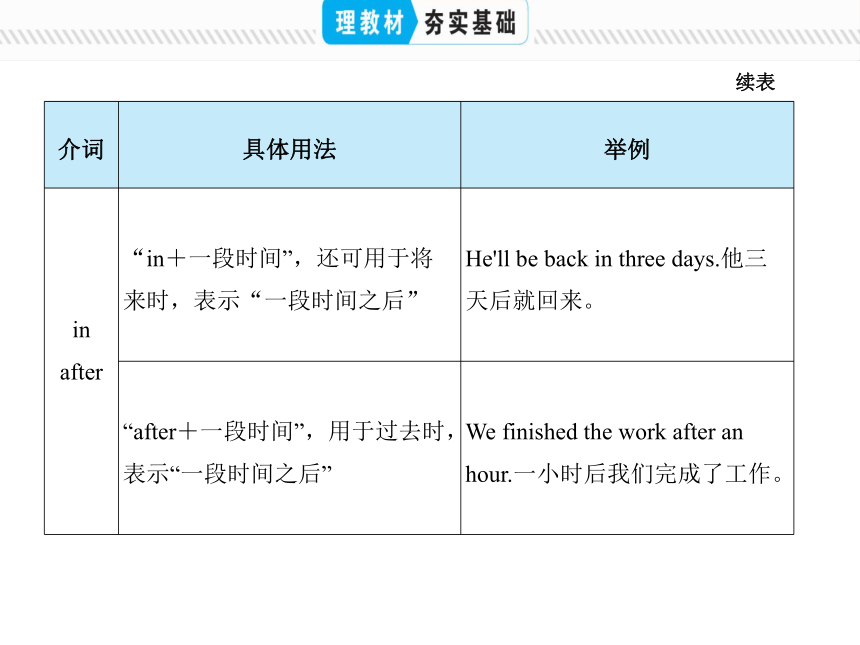
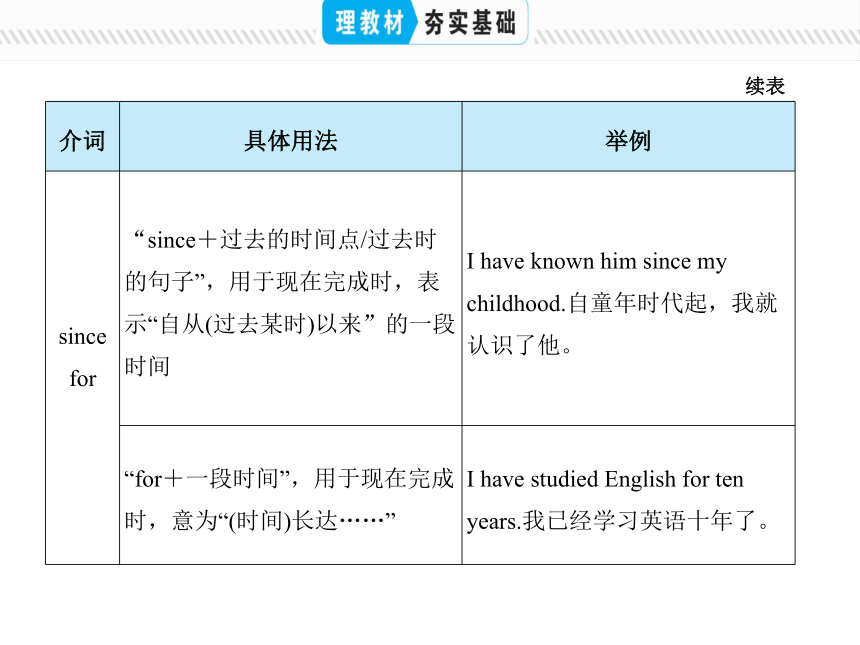
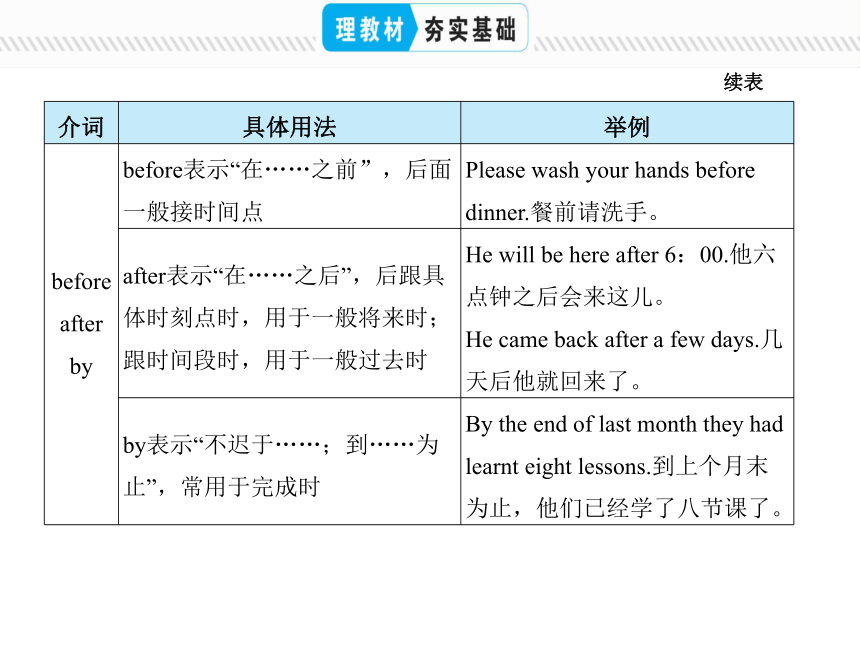
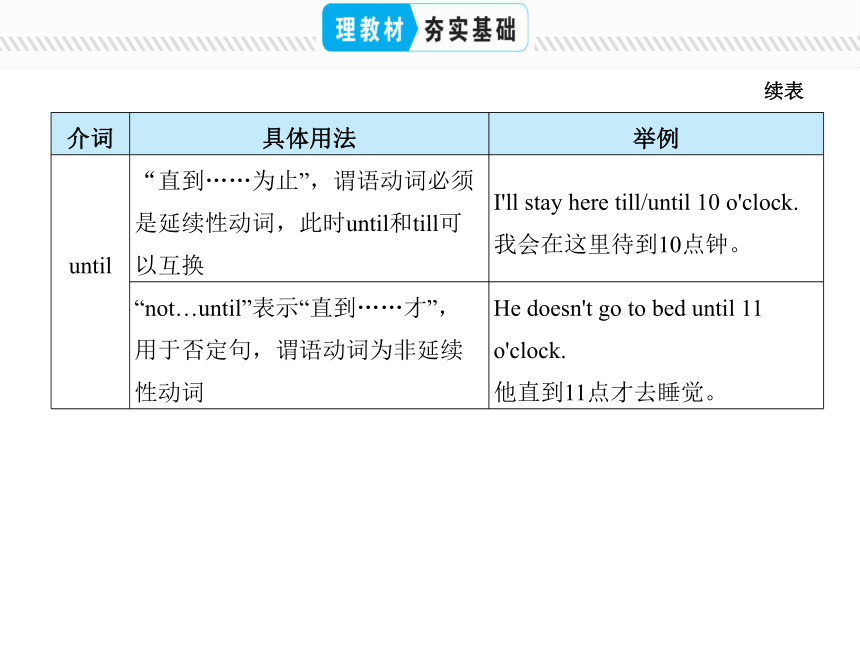
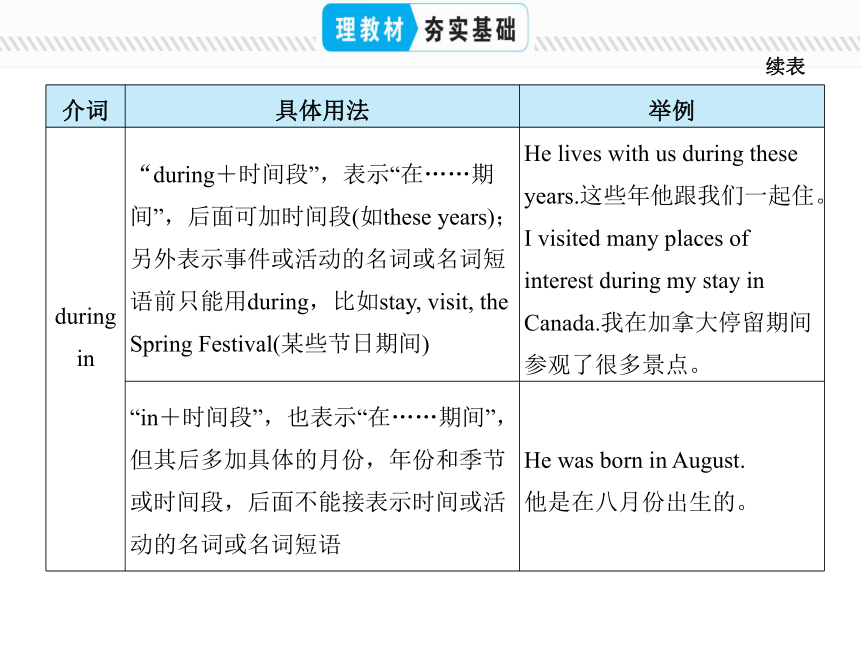
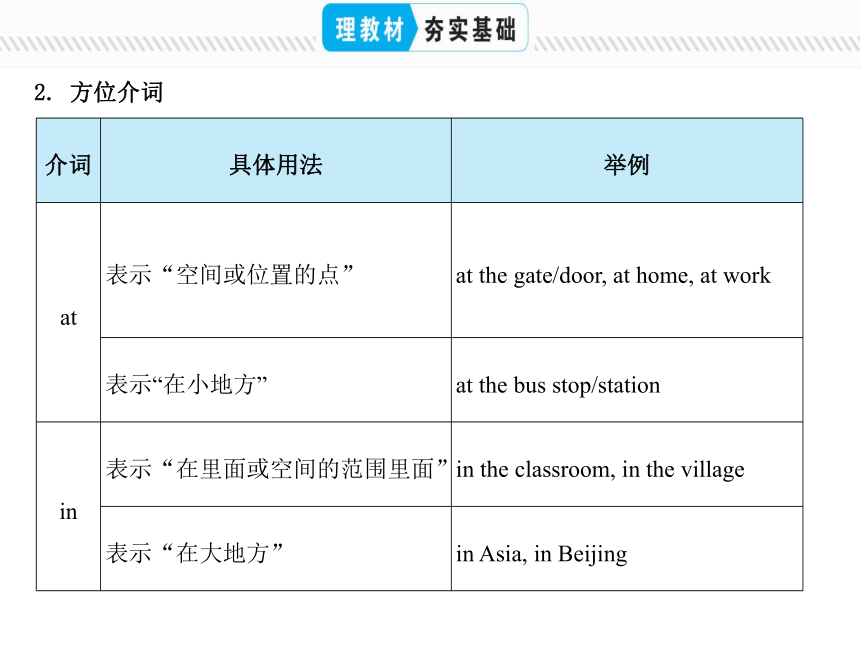
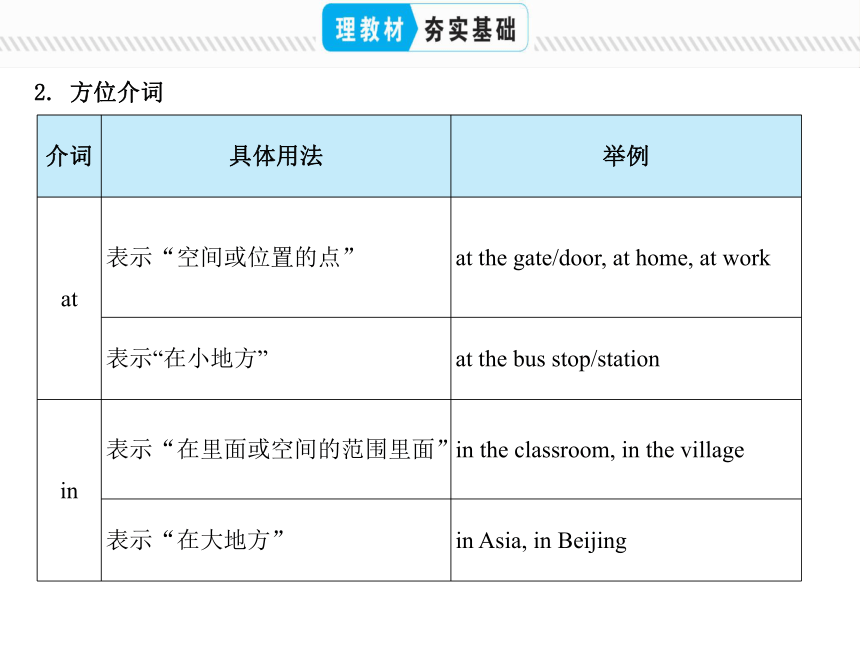
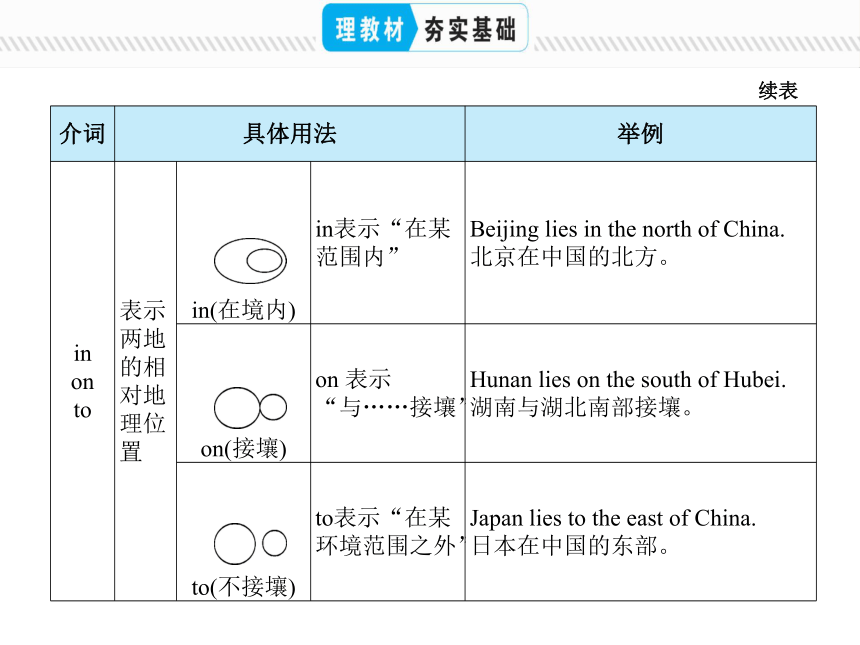
文档简介
(共39张PPT)
第 5讲 介 词
忆知识●巧导妙引
理教材●夯实基础
练好题●夯基提能
介词又称作前置词,表示它后面的名词或代词(或相当于名词的其他词类、短语或从句)与其他句子成分的关系。介词通常位于名词或代词之前。介词是一种虚词,不能单独作句子成分,只能用在一个名词、代词或相当于名词的结构之前,可以与后面的词一起构成介词短语。
常见介词的用法
1. 时间介词
介词 具体用法 举例
at on in at与具体时间点连用,或用于用餐时间和某些固定短语中 at four twenty, at noon, at night, at breakfast, at the moment, at last
介词 具体用法 举例
at on in on与具体的某一天连用,或用于具体某一天的早中晚或某些节日(只持续一天)等 on Monday, on a rainy morning, on the evening of May 1st;on Father's Day
in与月份、年份、季节连用,或用于某些固定短语中;也可以+一段时间表示在“一段时间之内”完成某个动作,与within同义 in 1999, in August, in autumn,
in the morning/afternoon/evening
I always eat my lunch in ten minutes.
我总是在十分钟内吃完午餐。
续表
续表
介词 具体用法 举例
in after “in+一段时间”,还可用于将来时,表示“一段时间之后” He'll be back in three days.他三天后就回来。
“after+一段时间”,用于过去时,表示“一段时间之后” We finished the work after an hour.一小时后我们完成了工作。
续表
介词 具体用法 举例
since for “since+过去的时间点/过去时的句子”,用于现在完成时,表示“自从(过去某时)以来”的一段时间 I have known him since my childhood.自童年时代起,我就认识了他。
“for+一段时间”,用于现在完成时,意为“(时间)长达……” I have studied English for ten years.我已经学习英语十年了。
续表
介词 具体用法 举例
before after by before表示“在……之前”,后面一般接时间点 Please wash your hands before dinner.餐前请洗手。
after表示“在……之后”,后跟具体时刻点时,用于一般将来时;跟时间段时,用于一般过去时 He will be here after 6:00.他六点钟之后会来这儿。
He came back after a few days.几天后他就回来了。
by表示“不迟于……;到……为止”,常用于完成时 By the end of last month they had learnt eight lessons.到上个月末为止,他们已经学了八节课了。
续表
介词 具体用法 举例
until “直到……为止”,谓语动词必须是延续性动词,此时until和till可以互换 I'll stay here till/until 10 o'clock.
我会在这里待到10点钟。
“not…until”表示“直到……才”,用于否定句,谓语动词为非延续性动词 He doesn't go to bed until 11 o'clock.
他直到11点才去睡觉。
续表
介词 具体用法 举例
during in “during+时间段”,表示“在……期间”,后面可加时间段(如these years);另外表示事件或活动的名词或名词短语前只能用during,比如stay, visit, the Spring Festival(某些节日期间) He lives with us during these years.这些年他跟我们一起住。
I visited many places of interest during my stay in Canada.我在加拿大停留期间参观了很多景点。
“in+时间段”,也表示“在……期间”,但其后多加具体的月份,年份和季节或时间段,后面不能接表示时间或活动的名词或名词短语 He was born in August.
他是在八月份出生的。
2. 方位介词
介词 具体用法 举例
at 表示“空间或位置的点” at the gate/door, at home, at work
表示“在小地方” at the bus stop/station
in 表示“在里面或空间的范围里面” in the classroom, in the village
表示“在大地方” in Asia, in Beijing
2. 方位介词
介词 具体用法 举例
at 表示“空间或位置的点” at the gate/door, at home, at work
表示“在小地方” at the bus stop/station
in 表示“在里面或空间的范围里面” in the classroom, in the village
表示“在大地方” in Asia, in Beijing
介词 具体用法 举例
in on to 表示两地的相对地理位置 in(在境内) in表示“在某范围内” Beijing lies in the north of China.
北京在中国的北方。
on(接壤) on 表示“与……接壤” Hunan lies on the south of Hubei.
湖南与湖北南部接壤。
to(不接壤) to表示“在某环境范围之外” Japan lies to the east of China.
日本在中国的东部。
续表
续表
介词 具体用法 举例
on over above on表示“在……的表面上”,与物体表面有接触; on还可以表示“关于”,相当于about; 或表示“处于工作状态中的” on the table, on the paper, on the wall
They attended a meeting on climate change.他们参加了一个关于气候变化的会议。
The light is still on.灯还亮着。
Turn on the radio.打开收音机。
over表示“在……的上方;越过”,强调在某物的垂直正上方 They built a new bridge over the river.
他们在河上建了一座桥。
above表示“在……上方,高于”,不强调在某物的正上方 The plane is flying above the clouds.
飞机在云层上方飞行。
Ice melts into water at temperatures above zero degrees Celsius.
温度在零摄氏度以上时,冰会融化为水。
续表
介词 具体用法 举例
beneath under below beneath表示“在……的下面”,与物体表面有接触,反义词是on The pen is beneath the book.
笔在书的下面。
under表示“在……的下方”,强调在某物的正下方,反义词是over There is a boat under the bridge.
桥下有一只小船。
below表示“在……的下面;低于”,不强调在某物的正下方,反义词是above There are many beautiful villages below the mountains.山下有很多美丽的村庄。
Night temperatures can drop below 15 degrees Celsius.夜间温度可能会降到15摄氏度以下。
续表
介词 具体用法 举例
in front of in the front of in front of表示“在(某物体外部)的前面” There are many old trees in front of the classroom.
教室前面有很多年老的树。
in the front of表示“在(某个范围内部)的前面” The teacher's desk is in the front of the classroom.
老师的讲台在教室的前面。
behind in the back of behind表示“在(某物体外部)的后面” Their classroom is behind the library.
他们的教室在图书馆后面。
in the back of表示“在(某个范围内部)的后面” His seat is in the back of the classroom.他的座位在教室的后面。
续表
介词 具体用法 举例
next to by beside near next to表示“紧挨着”,距离很近 Cindy sits next to her good friend.
辛迪紧挨着她好朋友坐着。
by表示“在……旁边”,与beside同义 We live by the river.我们住在河边。
beside表示“在……旁边”,强调靠近 Who's that girl beside the boy
在男孩旁边的那个女孩是谁?
near表示“在……附近”,距离比by远 Is there a hospital near here
这儿附近有医院吗?
3. 其他介词
介词 具体用法 举例
besides except except for but besides表示“除……外(还有)”,强调包含在内 Besides English, they also study math and Chinese.除了英语外,他们还学习数学和语文。
except表示“除了……之外(不包括在内)”, 强调“排除(其后的宾语)在外”,而且所排除的事物与前述对象为同一类事物 He answered all the questions except the last one.他除了最后一个问题,其他问题都回答了。(所排除的最后一个问题和前面提到的问题为同一类事物)
3. 其他介词
介词 具体用法 举例
besides except except for but except for表示“除了……之外(不包括在内)”,用于非同类事物,它的宾语与前述对象不属于同一类事物 The composition is very good except for a few spelling mistakes.除了几处拼写错误,这篇文章非常好。(文章和拼写错误不属于同一类事物)
but表示“除……之外(不包括在内)”,用法同except,但多用于all, none以及every, any, no组成的复合不定代词后 Europe will be represented in all but two of the seven races.7场比赛中除了2场之外, 都将有欧洲的代表参加。
He didn't speak anything but Greek.
他除了希腊语之外不会说其他任何语言。
续表
介词 具体用法 举例
by past by表示“从旁边经过” She walked by the square.她从广场旁经过。
past表示“经过,路过” She walked past the post office.她路过邮局。
like as like表示“像……一样”,用于说明相似关系;也可表示“例如”,用于举例说明,用法同such as Nancy is like her mother.南希和她妈妈一样。
They want to go to big cities like New York.他们想去像/比如纽约这样的大城市。
as表示“作为;以……的身份”,后面常跟表示职业的名词 He is famous as a scientist here.
他在此作为一个科学家而闻名。
续表
介词 具体用法 举例
of from in be made of表示“由……制成(可看出原材料)” The chairs are made of wood.
椅子由木头制成。
be made from表示“由……制成(看不出原材料)” Butter is made from milk.
黄油是从牛奶中提炼出来的。
be made in表示“在……制造”,指的是产地 The caps are made in China.
这些帽子是在中国制造的。
续表
介词 具体用法 举例
against for against表示“反对;对抗;依靠,碰撞” for可以表示“赞成,支持”,还可以表示“作为,为了,动作的对象,原因,持续一段时间等” He is against the plan.他反对这个计划。
The teacher is standing against the blackboard.
老师正靠着黑板站着。
The rain is beating hard against the window.
雨水在猛烈地敲打着窗户。
They are for the plan.他们支持这个计划。
What do you usually have for breakfast
你一般早餐吃什么?
He bought a scarf for her mother. 他给妈妈买了一条围巾。
They often play tennis for an hour after school.
他们经常放学后打一个小时的网球。
续表
介词 具体用法 举例
with with表示“和……一起;带有,留着” He always plays soccer with his father.
他经常和他爸爸一起踢足球。
I want a big house with a beautiful garden.
我想要一个带着漂亮花园的大房子。
Do you know the girl with long blonde hair
你认识那个留着长的金色头发的女孩吗?
without without表示“没有”,是with的反义词,相当于not with Men can't live without air and water.
人类没有空气和水就不能生存。
续表
介词 具体用法 举例
about around along about表示“关于,四处” Tell me something about your life.
告诉我你的生活情况。
He looked about himself. 他向四处张望。
around表示“在……周围,到处” Let's show you around the city.
让我们带你在城里转转。
along表示“顺着,沿着”,go along=go down,表示“沿着……走” Go along this street.沿着这条街一直走。
续表
介词 具体用法 举例
at to toward at有明确的方向,又带有较强的目的性 Don't shout at me!不要朝我喊叫!
to表示“到达……地点(目的地)或动作所指向的方向” He came to Japan in 1980.他1980年来到日本。
I excused myself and ran back to the telephone.我道了歉,跑回去接电话。
toward指方向、朝向,而不是目的地 He walked toward the gate of the park.
他朝着公园大门走去。(大门不是目的地)
续表
介词 具体用法 举例
for from off for表示“动身向某处”,常与leave, start, set off等连用 I'll leave for America next week.下周我将动身去美国。
from表示“来自,从……(离开,回来,看到,听到);距离……” They are from America.他们来自美国。
The Princess fled from the UAE.王妃逃离了阿联酋。
He came back home from work.他下班回到家。
The students live far away from the school.
这些学生住在离学校很远的地方。
续表
介词 具体用法 举例
for from off off表示“下(公交车,火车,飞机等); 关闭;从……下来(与……脱离); (从身体上摘,脱)下;减价打折” get off the bus; turn off the radio
The girl fell off the bike.这个女孩从单车上摔下来了。(离开了单车,与其脱离,不再有接触)
Take off your wet coat, or you'll catch a cold.
脱下你的湿外套吧,否则你会感冒的。
(take off还可以表示飞机起飞或者某人在事业上或者其他方面的突然成功)
The jacket is now 30% off.这件夹克现在7折。
续表
介词 具体用法 举例
with in by with表示“用、以、借” draw a picture with a pencil, walk with our feet
in表示“用材料、方式、方法、语言、声音”等;in还可以加服饰或颜色表示穿着某种(颜色的)服装 say it in English, in this way, write it in ink, say to me in a sweet voice
He was a big man, dressed in a suit and tie.
他是个高大的男人,穿着西服、打着领带。
Do you know the girl in red
你认识那个穿着红衣服的女孩吗?
by表示“行为方式、方法、手段、交通工具”等,后面的名词不加冠词,也无复数形式;by后也可以跟动名词 make it by hand, go to work by bus, learn English by reading aloud
续表
介词 具体用法 举例
up down up表示 “向上或向北”; down表示“向下或向南” run up the hill 跑上山
climb down the tree 爬下树
onto into out of onto表示“到……上面去”,into表示“进入……里面”,out of表示“指向……的外面”,这些词一般都与动作动词连用 Baby Mouse climbed onto his father's back.
小老鼠爬到了爸爸的背上。
You just need to put the letter into the mailbox to send it.你只需要把信投进邮筒就可以寄了。
When we looked out of our tent the next morning, we got a terrible surprise.
当第二天早上我们往帐篷外看的时候,我们大吃一惊。
4. 使用介词要注意的事项
(1)副词here,there,home,abroad, upstairs,downstairs前不用介词 come here,go there,get home,go upstairs/downstairs
(2)时间状语last,this,next,every, one前不用介词 We went sightseeing in Shanghai last summer holiday.上个暑假我们去上海旅游观光了。
(3)时间状语today,yesterday, tomorrow等前不用介词 I like to see a movie today,and like to do some reading at home tomorrow.
我想今天去看电影,明天在家里看书。
(4)介词后的人称代词要用宾格,不 用主格 for me,instead of him,look after us
(5)介词后的动词作宾语时,要加ing He is good at climbing trees.他擅长爬树。
5. 介词短语
in+名词 in need在困难中 in surprise惊讶 in front of在……前面
in time及时 in short总之 in order 整齐 in fact事实上
in general总之 in danger在危险中 in the way妨碍
in public公开地 in agreement意见一致 in one's opinion依某人看 in good health身体健康
at+名词 at least至少 at first首先 at once马上 at night在晚上
at home在家 at present目前 at sea在海上 at times偶尔
at birth出生时 at the same time同时
on+名词 on foot步行 on show展出 on duty值班 on time按时
on business出差 on holiday度假 on the way在途中
on the radio通过无线电广播 on sale降价出售
on purpose故意地
by+名词 by the way顺便一提 by accident偶然 by mistake错误地
by bike/bus/train骑自行车/乘公交车/坐火车
与形容词 搭配 be afraid of害怕 be full of充满
be proud of为……骄傲 be busy with忙于
be satisfied with对……满意 be strict with对……严格
be angry with和……生气 be late for迟到
be famous for因……闻名 be good for对……有益
be ready for为……做好准备 be absent from缺席
be different from和……不同 be friendly to对……友好
be similar to和……相似 be interested in对……感兴趣
续表
续表
与动词 搭配 look after照看 learn from向……学习 run after追赶
fight against与……作斗争 agree with同意 throw away 扔掉 come from来自 leave behind落下 talk back顶嘴 think of想;认为 think about考虑 think over反复思考 worry about担心 look forward to期待 thank you for感谢
其他常见 介词短语 such as例如 instead of代替 for example例如
because of由于 as for至于 for short简称
according to根据 thanks to多亏了 to start with首先
( )1. (2019·南京)Xinhua Zidian, or the New Chinese Dictionary, was first
published________ 1953.
A. on B. in C. at D. for
( )2. (2019·宿迁)Beijing Expo 2019 opened to the public ________ 29th April.
It will last over five months.
A. at B. in C. on D. of
B
【解析】考查时间介词用法。句意:《新华字典》第一次出版是在1953年。年份前面用介词in,故选B。
C
【解析】考查时间介词用法。句意:2019北京博览会于4月29日向公众开放。此次博览会将会持续五个月。29th April是具体的某一天,故用介词on,故选C。
( )3. (2019·安徽)On sunny days, my grandma often reads a novel ________
the window.
A. by B. for C. with D. from
A
【解析】考查地点介词用法。句意:在天气晴朗的日子里,我祖母经常在窗户边读小说。window为地点名词,这里用by,表示“在旁边”,故选A。
( )4. (2019·青岛) The high speed train________Qingdao and Beijing travels faster now. The train ride takes only about three hours.
A. from B. among C. in D. between
D
【解析】考查地点介词用法。句意:青岛至北京的高铁现在速度更快了,只需要大约三小时。高铁是位于青岛和北京之间,两者之间用介词between,故选D。
( )5. (2019·北京)We planted some flowers________the garden yesterday.
A.on B. to C. in D. of
( )6. (2019·定西)I'm going out. I'll be back________ an hour.
A. at B.on C. in D. from
C
C
【解析】考查时间介词用法。句意:我现在要出去了,半个小时后回来。in+一段时间可以表示“一段时间以后”,用于一般将来时,故选C。
【解析】考查地点介词用法。句意:我们昨天在花园里种了一些花。在花园这个地方,表示“在……里”,用介词in,故选C。
( )7. (2019·天水) Most of the villagers took part in the Dragon Boat races
________9:00 a.m. ________ the morning of June 7.
A. at, in B. on, on C. on, in D. at, on
( )8. (2019·泰州) Ladies and Gentlemen, welcome to Beijing! And if you need
any help, please call me________ 010 5558 6390.
A. at B. on C. with D. by
D
【解析】考查时间介词用法。句意:大多数的村民在6月7号早上九点参加了龙舟比赛。九点为具体的时刻点,前面介词用at;6月7号的早上为具体的某一天的早中晚,用on,故选D。
A
【解析】考查介词用法。句意:女士们先生们,欢迎来到北京。如果你需要帮助,请拨打010 5558 6390联系我。“call sb. at+电话号码”为固定搭配,故选A。
( )9. (2019·临沂)In the world, more than 30% of schools do not provide safe
drinking water ________about 570 million children.
A.with B. for C. towards
( )10. (2019·滨州) —I want to watch TV the whole day after the long journey.
—You shouldn't watch TV too much. It's bad________ your eyes.
A. on B. in C. for D. with
【解析】考查介词用法。句意:世界上有超过30%的学校没有为它们的大约5亿七千万的学生提供安全的饮用水。“provide sth. for sb.”意为“为某人提供某物”,为固定搭配,故选B。
B
C
【解析】考查介词用法。句意:——我想在这次长途旅行后整天看电视。——你不应该看太多的电视,这对你的眼睛不好。“be bad for…”意为“对……有坏处”,为固定搭配,故选C。
( )11. (2019·福建)—Is that your headmaster
—You mean the man ________ blue
A. on B. with C. in
( )12. (2019·天水)I want to learn a second language ________ English.
A.except B. beside C. besides D. except for
C
【解析】考查介词用法。句意:——那是你们校长吗?——你是说那个穿着蓝色衣服的男人吗?in+颜色表示穿着某种颜色的衣服,故选C。
【解析】考查介词用法。句意:除了英语之外,我还想再学一门语言。a second language这里的意思是再学一门语言(不是一门第二语言),再学一门,说明之前已经学过了一门英语。这里的“除了”要包括后面的宾语,应用besides,意为“除……之外,还有”,故选C
C
( )13. (2019·广东)I think tea will taste better ________ some milk in it.
A. for B. with C. from D. at
【解析】考查介词用法。句意:我认为茶里面加点牛奶会更好喝。根据句意得知是“加了/带有牛奶的茶”,表示“带有”,应用with,故选B。
B
第 5讲 介 词
忆知识●巧导妙引
理教材●夯实基础
练好题●夯基提能
介词又称作前置词,表示它后面的名词或代词(或相当于名词的其他词类、短语或从句)与其他句子成分的关系。介词通常位于名词或代词之前。介词是一种虚词,不能单独作句子成分,只能用在一个名词、代词或相当于名词的结构之前,可以与后面的词一起构成介词短语。
常见介词的用法
1. 时间介词
介词 具体用法 举例
at on in at与具体时间点连用,或用于用餐时间和某些固定短语中 at four twenty, at noon, at night, at breakfast, at the moment, at last
介词 具体用法 举例
at on in on与具体的某一天连用,或用于具体某一天的早中晚或某些节日(只持续一天)等 on Monday, on a rainy morning, on the evening of May 1st;on Father's Day
in与月份、年份、季节连用,或用于某些固定短语中;也可以+一段时间表示在“一段时间之内”完成某个动作,与within同义 in 1999, in August, in autumn,
in the morning/afternoon/evening
I always eat my lunch in ten minutes.
我总是在十分钟内吃完午餐。
续表
续表
介词 具体用法 举例
in after “in+一段时间”,还可用于将来时,表示“一段时间之后” He'll be back in three days.他三天后就回来。
“after+一段时间”,用于过去时,表示“一段时间之后” We finished the work after an hour.一小时后我们完成了工作。
续表
介词 具体用法 举例
since for “since+过去的时间点/过去时的句子”,用于现在完成时,表示“自从(过去某时)以来”的一段时间 I have known him since my childhood.自童年时代起,我就认识了他。
“for+一段时间”,用于现在完成时,意为“(时间)长达……” I have studied English for ten years.我已经学习英语十年了。
续表
介词 具体用法 举例
before after by before表示“在……之前”,后面一般接时间点 Please wash your hands before dinner.餐前请洗手。
after表示“在……之后”,后跟具体时刻点时,用于一般将来时;跟时间段时,用于一般过去时 He will be here after 6:00.他六点钟之后会来这儿。
He came back after a few days.几天后他就回来了。
by表示“不迟于……;到……为止”,常用于完成时 By the end of last month they had learnt eight lessons.到上个月末为止,他们已经学了八节课了。
续表
介词 具体用法 举例
until “直到……为止”,谓语动词必须是延续性动词,此时until和till可以互换 I'll stay here till/until 10 o'clock.
我会在这里待到10点钟。
“not…until”表示“直到……才”,用于否定句,谓语动词为非延续性动词 He doesn't go to bed until 11 o'clock.
他直到11点才去睡觉。
续表
介词 具体用法 举例
during in “during+时间段”,表示“在……期间”,后面可加时间段(如these years);另外表示事件或活动的名词或名词短语前只能用during,比如stay, visit, the Spring Festival(某些节日期间) He lives with us during these years.这些年他跟我们一起住。
I visited many places of interest during my stay in Canada.我在加拿大停留期间参观了很多景点。
“in+时间段”,也表示“在……期间”,但其后多加具体的月份,年份和季节或时间段,后面不能接表示时间或活动的名词或名词短语 He was born in August.
他是在八月份出生的。
2. 方位介词
介词 具体用法 举例
at 表示“空间或位置的点” at the gate/door, at home, at work
表示“在小地方” at the bus stop/station
in 表示“在里面或空间的范围里面” in the classroom, in the village
表示“在大地方” in Asia, in Beijing
2. 方位介词
介词 具体用法 举例
at 表示“空间或位置的点” at the gate/door, at home, at work
表示“在小地方” at the bus stop/station
in 表示“在里面或空间的范围里面” in the classroom, in the village
表示“在大地方” in Asia, in Beijing
介词 具体用法 举例
in on to 表示两地的相对地理位置 in(在境内) in表示“在某范围内” Beijing lies in the north of China.
北京在中国的北方。
on(接壤) on 表示“与……接壤” Hunan lies on the south of Hubei.
湖南与湖北南部接壤。
to(不接壤) to表示“在某环境范围之外” Japan lies to the east of China.
日本在中国的东部。
续表
续表
介词 具体用法 举例
on over above on表示“在……的表面上”,与物体表面有接触; on还可以表示“关于”,相当于about; 或表示“处于工作状态中的” on the table, on the paper, on the wall
They attended a meeting on climate change.他们参加了一个关于气候变化的会议。
The light is still on.灯还亮着。
Turn on the radio.打开收音机。
over表示“在……的上方;越过”,强调在某物的垂直正上方 They built a new bridge over the river.
他们在河上建了一座桥。
above表示“在……上方,高于”,不强调在某物的正上方 The plane is flying above the clouds.
飞机在云层上方飞行。
Ice melts into water at temperatures above zero degrees Celsius.
温度在零摄氏度以上时,冰会融化为水。
续表
介词 具体用法 举例
beneath under below beneath表示“在……的下面”,与物体表面有接触,反义词是on The pen is beneath the book.
笔在书的下面。
under表示“在……的下方”,强调在某物的正下方,反义词是over There is a boat under the bridge.
桥下有一只小船。
below表示“在……的下面;低于”,不强调在某物的正下方,反义词是above There are many beautiful villages below the mountains.山下有很多美丽的村庄。
Night temperatures can drop below 15 degrees Celsius.夜间温度可能会降到15摄氏度以下。
续表
介词 具体用法 举例
in front of in the front of in front of表示“在(某物体外部)的前面” There are many old trees in front of the classroom.
教室前面有很多年老的树。
in the front of表示“在(某个范围内部)的前面” The teacher's desk is in the front of the classroom.
老师的讲台在教室的前面。
behind in the back of behind表示“在(某物体外部)的后面” Their classroom is behind the library.
他们的教室在图书馆后面。
in the back of表示“在(某个范围内部)的后面” His seat is in the back of the classroom.他的座位在教室的后面。
续表
介词 具体用法 举例
next to by beside near next to表示“紧挨着”,距离很近 Cindy sits next to her good friend.
辛迪紧挨着她好朋友坐着。
by表示“在……旁边”,与beside同义 We live by the river.我们住在河边。
beside表示“在……旁边”,强调靠近 Who's that girl beside the boy
在男孩旁边的那个女孩是谁?
near表示“在……附近”,距离比by远 Is there a hospital near here
这儿附近有医院吗?
3. 其他介词
介词 具体用法 举例
besides except except for but besides表示“除……外(还有)”,强调包含在内 Besides English, they also study math and Chinese.除了英语外,他们还学习数学和语文。
except表示“除了……之外(不包括在内)”, 强调“排除(其后的宾语)在外”,而且所排除的事物与前述对象为同一类事物 He answered all the questions except the last one.他除了最后一个问题,其他问题都回答了。(所排除的最后一个问题和前面提到的问题为同一类事物)
3. 其他介词
介词 具体用法 举例
besides except except for but except for表示“除了……之外(不包括在内)”,用于非同类事物,它的宾语与前述对象不属于同一类事物 The composition is very good except for a few spelling mistakes.除了几处拼写错误,这篇文章非常好。(文章和拼写错误不属于同一类事物)
but表示“除……之外(不包括在内)”,用法同except,但多用于all, none以及every, any, no组成的复合不定代词后 Europe will be represented in all but two of the seven races.7场比赛中除了2场之外, 都将有欧洲的代表参加。
He didn't speak anything but Greek.
他除了希腊语之外不会说其他任何语言。
续表
介词 具体用法 举例
by past by表示“从旁边经过” She walked by the square.她从广场旁经过。
past表示“经过,路过” She walked past the post office.她路过邮局。
like as like表示“像……一样”,用于说明相似关系;也可表示“例如”,用于举例说明,用法同such as Nancy is like her mother.南希和她妈妈一样。
They want to go to big cities like New York.他们想去像/比如纽约这样的大城市。
as表示“作为;以……的身份”,后面常跟表示职业的名词 He is famous as a scientist here.
他在此作为一个科学家而闻名。
续表
介词 具体用法 举例
of from in be made of表示“由……制成(可看出原材料)” The chairs are made of wood.
椅子由木头制成。
be made from表示“由……制成(看不出原材料)” Butter is made from milk.
黄油是从牛奶中提炼出来的。
be made in表示“在……制造”,指的是产地 The caps are made in China.
这些帽子是在中国制造的。
续表
介词 具体用法 举例
against for against表示“反对;对抗;依靠,碰撞” for可以表示“赞成,支持”,还可以表示“作为,为了,动作的对象,原因,持续一段时间等” He is against the plan.他反对这个计划。
The teacher is standing against the blackboard.
老师正靠着黑板站着。
The rain is beating hard against the window.
雨水在猛烈地敲打着窗户。
They are for the plan.他们支持这个计划。
What do you usually have for breakfast
你一般早餐吃什么?
He bought a scarf for her mother. 他给妈妈买了一条围巾。
They often play tennis for an hour after school.
他们经常放学后打一个小时的网球。
续表
介词 具体用法 举例
with with表示“和……一起;带有,留着” He always plays soccer with his father.
他经常和他爸爸一起踢足球。
I want a big house with a beautiful garden.
我想要一个带着漂亮花园的大房子。
Do you know the girl with long blonde hair
你认识那个留着长的金色头发的女孩吗?
without without表示“没有”,是with的反义词,相当于not with Men can't live without air and water.
人类没有空气和水就不能生存。
续表
介词 具体用法 举例
about around along about表示“关于,四处” Tell me something about your life.
告诉我你的生活情况。
He looked about himself. 他向四处张望。
around表示“在……周围,到处” Let's show you around the city.
让我们带你在城里转转。
along表示“顺着,沿着”,go along=go down,表示“沿着……走” Go along this street.沿着这条街一直走。
续表
介词 具体用法 举例
at to toward at有明确的方向,又带有较强的目的性 Don't shout at me!不要朝我喊叫!
to表示“到达……地点(目的地)或动作所指向的方向” He came to Japan in 1980.他1980年来到日本。
I excused myself and ran back to the telephone.我道了歉,跑回去接电话。
toward指方向、朝向,而不是目的地 He walked toward the gate of the park.
他朝着公园大门走去。(大门不是目的地)
续表
介词 具体用法 举例
for from off for表示“动身向某处”,常与leave, start, set off等连用 I'll leave for America next week.下周我将动身去美国。
from表示“来自,从……(离开,回来,看到,听到);距离……” They are from America.他们来自美国。
The Princess fled from the UAE.王妃逃离了阿联酋。
He came back home from work.他下班回到家。
The students live far away from the school.
这些学生住在离学校很远的地方。
续表
介词 具体用法 举例
for from off off表示“下(公交车,火车,飞机等); 关闭;从……下来(与……脱离); (从身体上摘,脱)下;减价打折” get off the bus; turn off the radio
The girl fell off the bike.这个女孩从单车上摔下来了。(离开了单车,与其脱离,不再有接触)
Take off your wet coat, or you'll catch a cold.
脱下你的湿外套吧,否则你会感冒的。
(take off还可以表示飞机起飞或者某人在事业上或者其他方面的突然成功)
The jacket is now 30% off.这件夹克现在7折。
续表
介词 具体用法 举例
with in by with表示“用、以、借” draw a picture with a pencil, walk with our feet
in表示“用材料、方式、方法、语言、声音”等;in还可以加服饰或颜色表示穿着某种(颜色的)服装 say it in English, in this way, write it in ink, say to me in a sweet voice
He was a big man, dressed in a suit and tie.
他是个高大的男人,穿着西服、打着领带。
Do you know the girl in red
你认识那个穿着红衣服的女孩吗?
by表示“行为方式、方法、手段、交通工具”等,后面的名词不加冠词,也无复数形式;by后也可以跟动名词 make it by hand, go to work by bus, learn English by reading aloud
续表
介词 具体用法 举例
up down up表示 “向上或向北”; down表示“向下或向南” run up the hill 跑上山
climb down the tree 爬下树
onto into out of onto表示“到……上面去”,into表示“进入……里面”,out of表示“指向……的外面”,这些词一般都与动作动词连用 Baby Mouse climbed onto his father's back.
小老鼠爬到了爸爸的背上。
You just need to put the letter into the mailbox to send it.你只需要把信投进邮筒就可以寄了。
When we looked out of our tent the next morning, we got a terrible surprise.
当第二天早上我们往帐篷外看的时候,我们大吃一惊。
4. 使用介词要注意的事项
(1)副词here,there,home,abroad, upstairs,downstairs前不用介词 come here,go there,get home,go upstairs/downstairs
(2)时间状语last,this,next,every, one前不用介词 We went sightseeing in Shanghai last summer holiday.上个暑假我们去上海旅游观光了。
(3)时间状语today,yesterday, tomorrow等前不用介词 I like to see a movie today,and like to do some reading at home tomorrow.
我想今天去看电影,明天在家里看书。
(4)介词后的人称代词要用宾格,不 用主格 for me,instead of him,look after us
(5)介词后的动词作宾语时,要加ing He is good at climbing trees.他擅长爬树。
5. 介词短语
in+名词 in need在困难中 in surprise惊讶 in front of在……前面
in time及时 in short总之 in order 整齐 in fact事实上
in general总之 in danger在危险中 in the way妨碍
in public公开地 in agreement意见一致 in one's opinion依某人看 in good health身体健康
at+名词 at least至少 at first首先 at once马上 at night在晚上
at home在家 at present目前 at sea在海上 at times偶尔
at birth出生时 at the same time同时
on+名词 on foot步行 on show展出 on duty值班 on time按时
on business出差 on holiday度假 on the way在途中
on the radio通过无线电广播 on sale降价出售
on purpose故意地
by+名词 by the way顺便一提 by accident偶然 by mistake错误地
by bike/bus/train骑自行车/乘公交车/坐火车
与形容词 搭配 be afraid of害怕 be full of充满
be proud of为……骄傲 be busy with忙于
be satisfied with对……满意 be strict with对……严格
be angry with和……生气 be late for迟到
be famous for因……闻名 be good for对……有益
be ready for为……做好准备 be absent from缺席
be different from和……不同 be friendly to对……友好
be similar to和……相似 be interested in对……感兴趣
续表
续表
与动词 搭配 look after照看 learn from向……学习 run after追赶
fight against与……作斗争 agree with同意 throw away 扔掉 come from来自 leave behind落下 talk back顶嘴 think of想;认为 think about考虑 think over反复思考 worry about担心 look forward to期待 thank you for感谢
其他常见 介词短语 such as例如 instead of代替 for example例如
because of由于 as for至于 for short简称
according to根据 thanks to多亏了 to start with首先
( )1. (2019·南京)Xinhua Zidian, or the New Chinese Dictionary, was first
published________ 1953.
A. on B. in C. at D. for
( )2. (2019·宿迁)Beijing Expo 2019 opened to the public ________ 29th April.
It will last over five months.
A. at B. in C. on D. of
B
【解析】考查时间介词用法。句意:《新华字典》第一次出版是在1953年。年份前面用介词in,故选B。
C
【解析】考查时间介词用法。句意:2019北京博览会于4月29日向公众开放。此次博览会将会持续五个月。29th April是具体的某一天,故用介词on,故选C。
( )3. (2019·安徽)On sunny days, my grandma often reads a novel ________
the window.
A. by B. for C. with D. from
A
【解析】考查地点介词用法。句意:在天气晴朗的日子里,我祖母经常在窗户边读小说。window为地点名词,这里用by,表示“在旁边”,故选A。
( )4. (2019·青岛) The high speed train________Qingdao and Beijing travels faster now. The train ride takes only about three hours.
A. from B. among C. in D. between
D
【解析】考查地点介词用法。句意:青岛至北京的高铁现在速度更快了,只需要大约三小时。高铁是位于青岛和北京之间,两者之间用介词between,故选D。
( )5. (2019·北京)We planted some flowers________the garden yesterday.
A.on B. to C. in D. of
( )6. (2019·定西)I'm going out. I'll be back________ an hour.
A. at B.on C. in D. from
C
C
【解析】考查时间介词用法。句意:我现在要出去了,半个小时后回来。in+一段时间可以表示“一段时间以后”,用于一般将来时,故选C。
【解析】考查地点介词用法。句意:我们昨天在花园里种了一些花。在花园这个地方,表示“在……里”,用介词in,故选C。
( )7. (2019·天水) Most of the villagers took part in the Dragon Boat races
________9:00 a.m. ________ the morning of June 7.
A. at, in B. on, on C. on, in D. at, on
( )8. (2019·泰州) Ladies and Gentlemen, welcome to Beijing! And if you need
any help, please call me________ 010 5558 6390.
A. at B. on C. with D. by
D
【解析】考查时间介词用法。句意:大多数的村民在6月7号早上九点参加了龙舟比赛。九点为具体的时刻点,前面介词用at;6月7号的早上为具体的某一天的早中晚,用on,故选D。
A
【解析】考查介词用法。句意:女士们先生们,欢迎来到北京。如果你需要帮助,请拨打010 5558 6390联系我。“call sb. at+电话号码”为固定搭配,故选A。
( )9. (2019·临沂)In the world, more than 30% of schools do not provide safe
drinking water ________about 570 million children.
A.with B. for C. towards
( )10. (2019·滨州) —I want to watch TV the whole day after the long journey.
—You shouldn't watch TV too much. It's bad________ your eyes.
A. on B. in C. for D. with
【解析】考查介词用法。句意:世界上有超过30%的学校没有为它们的大约5亿七千万的学生提供安全的饮用水。“provide sth. for sb.”意为“为某人提供某物”,为固定搭配,故选B。
B
C
【解析】考查介词用法。句意:——我想在这次长途旅行后整天看电视。——你不应该看太多的电视,这对你的眼睛不好。“be bad for…”意为“对……有坏处”,为固定搭配,故选C。
( )11. (2019·福建)—Is that your headmaster
—You mean the man ________ blue
A. on B. with C. in
( )12. (2019·天水)I want to learn a second language ________ English.
A.except B. beside C. besides D. except for
C
【解析】考查介词用法。句意:——那是你们校长吗?——你是说那个穿着蓝色衣服的男人吗?in+颜色表示穿着某种颜色的衣服,故选C。
【解析】考查介词用法。句意:除了英语之外,我还想再学一门语言。a second language这里的意思是再学一门语言(不是一门第二语言),再学一门,说明之前已经学过了一门英语。这里的“除了”要包括后面的宾语,应用besides,意为“除……之外,还有”,故选C
C
( )13. (2019·广东)I think tea will taste better ________ some milk in it.
A. for B. with C. from D. at
【解析】考查介词用法。句意:我认为茶里面加点牛奶会更好喝。根据句意得知是“加了/带有牛奶的茶”,表示“带有”,应用with,故选B。
B
同课章节目录
- 词法
- 名词
- 动词和动词短语
- 动词语态
- 动词时态
- 助动词和情态动词
- 非谓语动词
- 冠词
- 代词
- 数词和量词
- 形容词副词及其比较等级
- 介词和介词短语
- 连词和感叹词
- 构词法
- 相似、相近词比较
- 句法
- 陈述句
- 一般疑问句和否定疑问句
- 特殊疑问句及选择疑问句
- 反意疑问句
- 存在句(There be句型)
- 宾语从句
- 定语从句
- 状语从句
- 主谓一致问题
- 简单句
- 并列句
- 复合句
- 主谓一致
- 主、表语从句
- 名词性从句
- 直接引语和间接引语
- 虚拟语气
- 感叹句
- 强调句
- 倒装句
- 祈使句
- 句子的成分
- 句子的分类
- 题型专区
- 单项选择部分
- 易错题
- 完形填空
- 阅读理解
- 词汇练习
- 听说训练
- 句型转换
- 补全对话
- 短文改错
- 翻译
- 书面表达
- 任务型阅读
- 语法填空
- 其他资料
